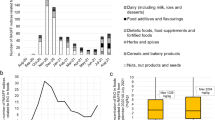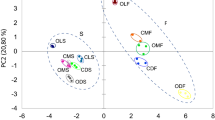Abstract
Tea is considered as a ‘health beverage’ due its antioxidant properties and resultant beneficial effects on human health. Such a beverage should be free from toxic elements such as pesticide residues and heavy metals. A large scale survey of teas produced in the tea factories of south India had been carried out for a period of three years from 2006 to 2008 and 912 tea samples were analysed for the residues of certain pesticides such as dicofol, ethion, quinalphos, hexaconazole, fenpropathrin, fenvalerate and propargite which are used for pest and disease control in tea in this part of the country. The analytical data proved that only less than 0.5 percentage of tea samples had residues of these pesticides. However, residues of pesticides were below their maximum limits in tea, stipulated by the European Union, Codex Alimentarius Commission of FAO/WHO and Prevention of Food Adulteration Act of Govt. of India.
Similar content being viewed by others
References
AOAC (2005). Official methods of analysis of AOAC international (18th ed.). Gaithersburg: AOAC.
Bishnu, A., Chakrabarti, K., Chakrabarti, A., & Saha, T. (2009). Pesticide residue level in tea ecosystems of Hill and Dooars regions of West Bengal, India. Environmental Monitoring and Assessment, 149, 457–464.
Chen, Z. M., & Haibin, W. (1988). Factors affecting residues of pesticides in Tea. Pesticide Science, 23, 109–118.
Chen, Z. M., Wan, H. B., & Xia, H. L. (1990). The fate of pesticides in plantations and the design of parameters for selecting suitable pesticides. In: Proceedings of international seminar on recent developments in the field of pesticides and their application to pest control (pp. 328–336). The People’s Republic of China.
Garcia-Reyes, J. F., Lopez, G. B., Diaz, A. M., & Fernandez-Alba, A. R. (2008). Survey on the pesticide residues in tea in south India. Analytical Chemistry, 80(23), 8966–8974.
IS 5864 (1983). Indian standard. Method for determination of DDT residues in food commodities. (I rev. Reaffirmed 1999). Manak Bhavan, New Delhi: Bureau of Indian Standards.
IS 14437 (1997). Indian standard. Method for determination of quinalphos residues in agricultural and food commodities. Manak Bhavan, New Delhi: Bureau of Indian Standards.
IS 14629 (1999). Indian standard. Method for determination of dicofol residues in agricultural and food commodities. Manak Bhavan, New Delhi: Bureau of Indian Standards.
IS 11773 (2003). Indian standard. Methods for determination of ethion residues in food commodities (I rev.). Manak Bhavan, New Delhi: Bureau of Indian Standards.
Jaggi, S., Sood, C., Kumar, V., Ravindranath, S. D., & Shanker, A. (2001). Leaching of pesticides in tea brew. Journal of Agricultural and Food Chemistry, 49, 5479–5483.
Manikandan, K. N., Karthika, C., Muraleedharan, N., Seenivasan, S., & Selvasundaram, R. (2006). Studies on the residues of copper and hexaconazole during their combined application and their subsequent transfer into tea infusion. Journal of Plantation Crops, 34(3), 405–409.
Manikandan, N., Seenivasan, S., Ganapathy, M. N. K., Muraleedharan, N., & Selvasundaram, R. (2008). Leaching of residues of certain pesticides from black tea to brew. Food Chemistry, 113, 522–525.
Selvasundaram, R. (2002). Entomology (pp. 31–32). Annual Report of UPASI Tea Research Institute, Nirar Dam BPO, Valparai – 642 127, Coimbatore Dt., India.
Author information
Authors and Affiliations
Corresponding author
Rights and permissions
About this article
Cite this article
Seenivasan, S., Muraleedharan, N. Survey on the pesticide residues in tea in south India. Environ Monit Assess 176, 365–371 (2011). https://doi.org/10.1007/s10661-010-1589-y
Received:
Accepted:
Published:
Issue Date:
DOI: https://doi.org/10.1007/s10661-010-1589-y




